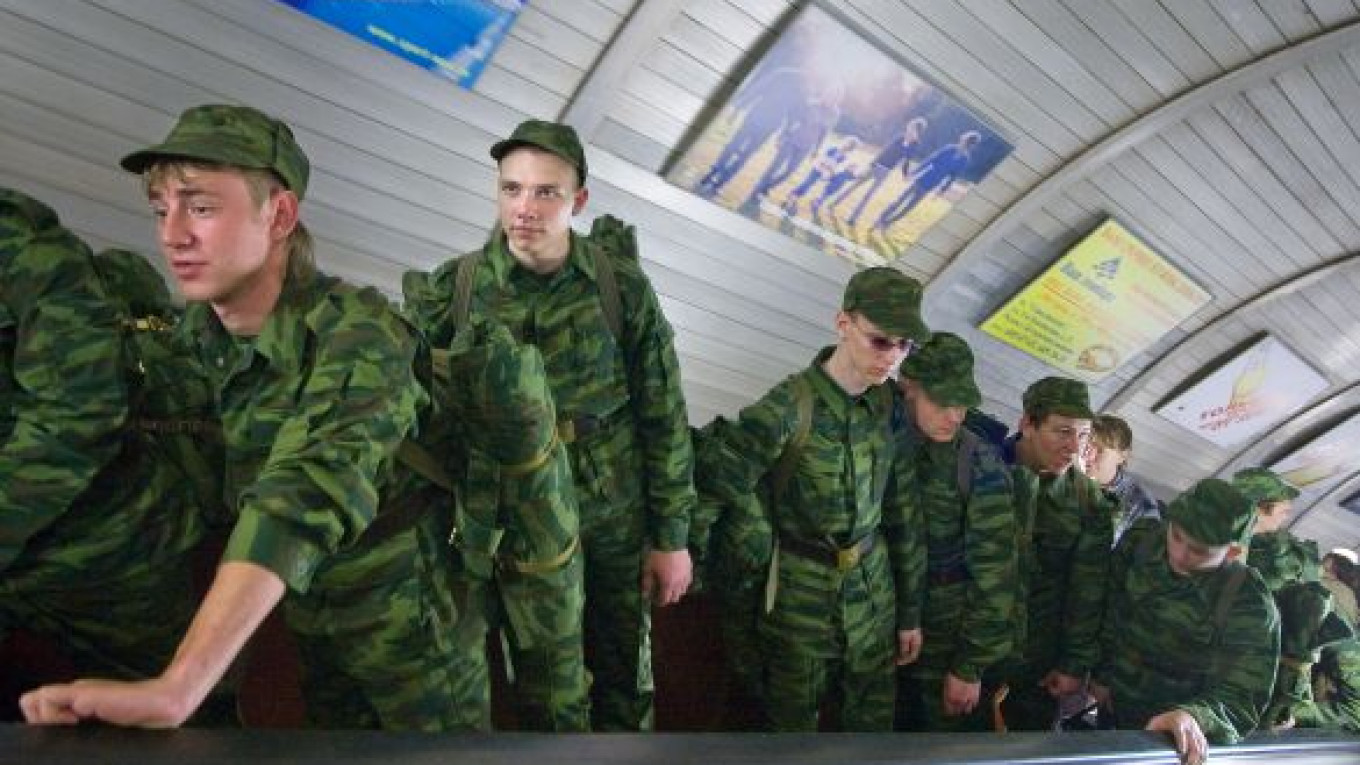The Defense Ministry is expected to call up about 150,000 young men for military service during the fall draft that begins Tuesday, amid contradictory reports about the scale of hazing in the army, a problem that has long plagued Russia's armed forces and led to draft dodging.
Complaints about violence in the army have been on the rise since spring, Valentina Melnikova, the Union of the Committees of Soldiers' Mothers of Russia, said Monday.
"Unfortunately, in the past year, the situation in the army has grown worse," she said, telling a reporter privately that complaints about "beatings and humiliations" submitted to the union amounted to a few hundred, but that the group did not keep comprehensive statistics.
Major General Alexander Nikitin, a department head at the Chief Military Prosecutor's Office, offered a different account to reporters, however, saying various violations in the army in the past several years had decreased by between 5 and 20 percent each year.
Nikitin did not specify which years he was referring to, but the official statistics resonated with the trend observed by the Soldiers' Mothers Union between the start of 2008 and the start of 2013, when the group said violations of conscripts' rights were declining.
Many complaints since August have involved military officials refusing to accept medical references from chronically ill young men, which would excuse them from military duty, Melnikova said.
The worsening trend may be linked to the appointment of Sergei Shoigu as defense minister last November, she said.
"The new minister has failed to send a signal to officers that they must not violate the law," she said. "Serdyukov made it clear, Shoigu did not."
About 3 million young men will get draft notices, but only some of them will be drafted, Melnikova told the news conference.
Many dodge the draft for fear of hazing.
In the spring alone, more than 15,000 conscripts were convicted of administrative offenses related to evading the draft, and an average yearly number of such offenders amounts to about 30,000 people, Nikitin said.
Seva, 22, a Muscovite eligible for the draft, is just one of many to have gone to extremes to avoid being drafted. He was hospitalized during the spring draft after intentionally eating expired fish liver and drinking sour milk in order to make use of the law banning military officials from drafting ill conscripts.
"I felt really sick. I was vomiting and had diarrhea, but it was still better than going to the army," Seva, who refused to give his last name for fear of being tracked down by officials, said by telephone.
Evading the military draft qualifies as a criminal offense punishable by up to two years in prison, and about 1,000 conscripts per year get convicted, Nikitin said.
At Monday's news conference, Nikitin pledged to "fight mercilessly against those who try to capitalize on the draft issue," apparently referring to those who help conscripts avoid the draft by illegal means.
Perhaps in an attempt to make the draft less daunting for potential conscripts, military officials have added some innovations to this fall's draft.
Novations include conscription into scientific and sports squadrons, with up to 60 men in the scientific unit, Major General Alexander Burdinsky said Monday, RIA Novosti reported. In addition, young men from families that suffered grave damage in the recent floods in the Far East will be excused from the draft, Burdinsky said.
Conscripts will also be allowed to take their dogs to the service if the pets possess the necessary skills, he said.
In accordance with the decree signed by President Vladimir Putin on Thursday, military officials must draft 150,030 young men between Oct. 1 and Dec. 31.
Contact the author at [email protected]
A Message from The Moscow Times:
Dear readers,
We are facing unprecedented challenges. Russia's Prosecutor General's Office has designated The Moscow Times as an "undesirable" organization, criminalizing our work and putting our staff at risk of prosecution. This follows our earlier unjust labeling as a "foreign agent."
These actions are direct attempts to silence independent journalism in Russia. The authorities claim our work "discredits the decisions of the Russian leadership." We see things differently: we strive to provide accurate, unbiased reporting on Russia.
We, the journalists of The Moscow Times, refuse to be silenced. But to continue our work, we need your help.
Your support, no matter how small, makes a world of difference. If you can, please support us monthly starting from just $2. It's quick to set up, and every contribution makes a significant impact.
By supporting The Moscow Times, you're defending open, independent journalism in the face of repression. Thank you for standing with us.
Remind me later.






